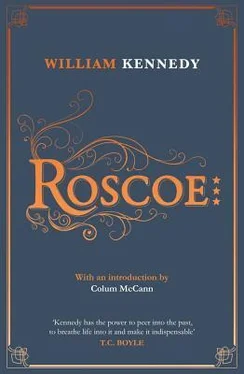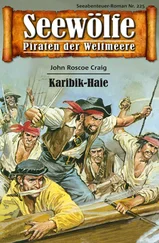“What happened?” Veronica said in panic, and she took Roscoe’s arm. “Are you hurt?”
“Just the usual bareback shock waves,” Roscoe said. “It happens to everybody.” He slowly straightened himself. “Ticky,” he said, sitting on the bale of hay, “tell Gilby what your father told you about horses.”
“Oh, my father,” Ticky said. “Peoples used to say about my father, ‘Oh, he’s a good man with a horse,’ and I’d say, ‘Pa, what you doin’ with that horse? Is that the way you do it?’ And he’d say, ‘Shut up, boy. You wanna learn, go out on your own,’ and he wouldn’t teach me. I worked for other horsemens and they’d teach me. But I didn’t have no father about knowin’ horses.”
“Me either,” said Roscoe, who was trying to sit in a way that controlled his pain. “Now, you take my father. He created a big family and then he left us to live in a hotel. When he lived home he never let me into his bedroom, and if he caught me there he’d lock me in the attic. So I’d stay in my room, reading atlases, memorizing poems and songs and countries and cities, and my brain got so crowded there was no room for the baseball scores. But I liked it so much they took me to the doctor, who talked to me for a week and then said nothing was wrong with my head and all I needed was to go up and see those ghosts again, the ones your father and I saw when we were kids up at Tristano — two old men who came out in the middle of the night and sat by the fireplace in the Trophy House and drank brandy and talked and looked out at the moon until the sun came up on the lake, and then they got up and went away.”
Gilby stared at Roscoe and said, “You saw ghosts?”
“Absolutely.”
“You talked to them?”
“We could hear them whispering. They’d say to one another, ‘Wisha-wisha-wisha-wisha-wisha.’ ”
“What’s that mean?”
“It’s ghost talk.”
“My father never told me about that.”
“He was saving it till you were old enough to appreciate ghosts.”
“I’m old enough.”
“Then I’ll tell you what. I’m of the opinion that your father could very well be up there at Tristano with those ghosts. It’s the sort of place fathers go when they die, especially a father like yours, who liked to talk and fish and was very fond of ghosts. We’ll both go up there one of these days and wait till the ghosts come out, and then we’ll sit and watch them and listen to what they say. And when the sun comes up and the ghosts go to bed, we might even do some fishing. Sound all right?”
“All right,” Gilby said. “All right.”
Ticky was nodding, and as Roscoe stood up, in obvious pain, Veronica handed the witch doctor his hat and coat. She felt blackly excited by his presence, a new thing that hinted there would come a day when her marriage to Elisha would be over. She couldn’t tell Roscoe about this feeling, because she didn’t understand it herself. It was new and unwelcome and she felt guilty for having it. Roscoe had made Gilby’s smile steadfast, but the boy wasn’t out of danger just because his mood had changed. It was possible to lose him, as she’d lost her sweet baby Rosemary.
She put her arm around Gilby and squeezed him as they walked toward the house. Roscoe walked very slowly behind her, his coat slung over his shoulder, his hat on the back of his head, always close in her life, always a puzzle, so gifted, so audacious, so shy Sometimes she decided Roscoe was spiritually illegal, a bootlegger of the soul, a mythic creature made of words and wit and wild deeds and boundless memory. She looked at him and saw a man of immense spirit, a man for loss, just as she was a woman for loss. She reached back and took his hand.
When they were in the main parlor of the house and Gilby had gone upstairs, she took both Roscoe’s hands in hers and, standing in the burnished light of this rare Tivoli afternoon, she raised her face to his and kissed him on the mouth in a way she had kissed no other man since the Elisha of a sensual yesterday. Roscoe, suddenly transformed into six feet two and a half inches of tapioca pudding, tried to firm himself; and he grew bold.
“Will you spend one day alone with me?” he asked.
“A day alone? Where?”
“Tristano. I’m asking for a day, not a night.”
“It takes half a day just to get there.”
“We can leave early, come home late. A long day. Or we can stay over if you want to, but that’s not what I’m asking.”
“We wouldn’t be alone. There are caretakers at Tristano.”
“We’ll blindfold them. Are you creating impediments to avoid an answer?”
“I have an answer.”
“What is it?”
“Perhaps.”
“You crush me,” Roscoe said, “under the burden of hope. I pray I can survive it.”
As he walked to his car, Roscoe saw a crow, blacker and larger than crows he had known, and female, which he deduced after she landed on an upper branch of an oak tree and was immediately set upon by another large, black crow, which mounted her; and they lay sideways on the branch and copulated. Roscoe stopped the car to watch and became convinced the female crow was smiling. Roscoe might have taken this to be a good omen, but it was too proximate to his kiss, the crows were black as sin, and they were crows enthralled by passion. They were the crows of fornication.
What did you expect, Roscoe, the bluebirds of happiness?
On the road, Roscoe met the women who died of love, some naked, some garbed as when love took them, a legion stretching to the horizon.
“Roscoe, Roscoe,” one warned as they passed, “love is a form of war.”
“I always knew that,” he said.
“Keep yourself chaste for your beloved,” said a woman dressed as a bride, “and if you want love, avoid lies and avarice.”
“I have no beloved, lies are my business, and without avarice we’d have chaos in City Hall,” Roscoe told her.
“Do not lust for every woman,” said a naked siren, still voluptuous in death, “for that turns a man into a shameless dog. Seek love where nubile women are found: the horse races, the theater, the law courts.”
“I’ve looked in all those places, but I’ve yet to find one for me. You have a nubile look about you. What are you doing tonight?”
“Nice try,” said the dead siren. “Just keep remembering that the pursuit of love makes an ugly man handsome, a fat man thin, that love transforms shame into glory, and falsity into truth. And if you fail with love, your only consolation is food and drink.”
Then she passed on, and Roscoe was enveloped by hunger, thirst, desire, and gloom.
Picture Roscoe: he is wearing his blue-and-white-vertical-striped pajamas; his stomach pain from the accident seems worse, though he is trying to ignore it, trying to sleep in the double bed of his suite in the Ten Eyck. He is a hotel-dweller and probably will remain so for the rest of his days. He has no yen to live the landed life of Patsy of the mountain, or Elisha of the manor, though Veronica could talk him into the manor if she played her cards right. He is by nature a guest, not a host, though he usually picks up the check. He has never craved the permanence so many others desire, but he does seem permanent here, at least in open-ended continuity; for in these rooms his father lived the last years of his life: in this very same bedroom, bath, and sitting room, though the rug is new.
His father’s influence is every where in Roscoe, even in those names of his: Rosky, Ros, Rah-Rah (what Gilby used to call him), diminutives of Roscius, from Quintus Roscius, the Roman comic actor and friend of Cicero, “so you wouldn’t be typed as an Irishman,” Felix told him. Roscoe is a lawyer because Felix read law in Peter Coogan’s office but never finished law school. He’s in politics because it was in his bones; and Felix, before he died in 1919, counseled Patsy, Elisha, and Roscoe regularly on how to invent themselves as the saviors of Albany Democracy. It’s true Roscoe has gone beyond his father by becoming a lawyer, but, no, he’ll never match his father’s political fame, indeed has never held a public office.
Читать дальше












